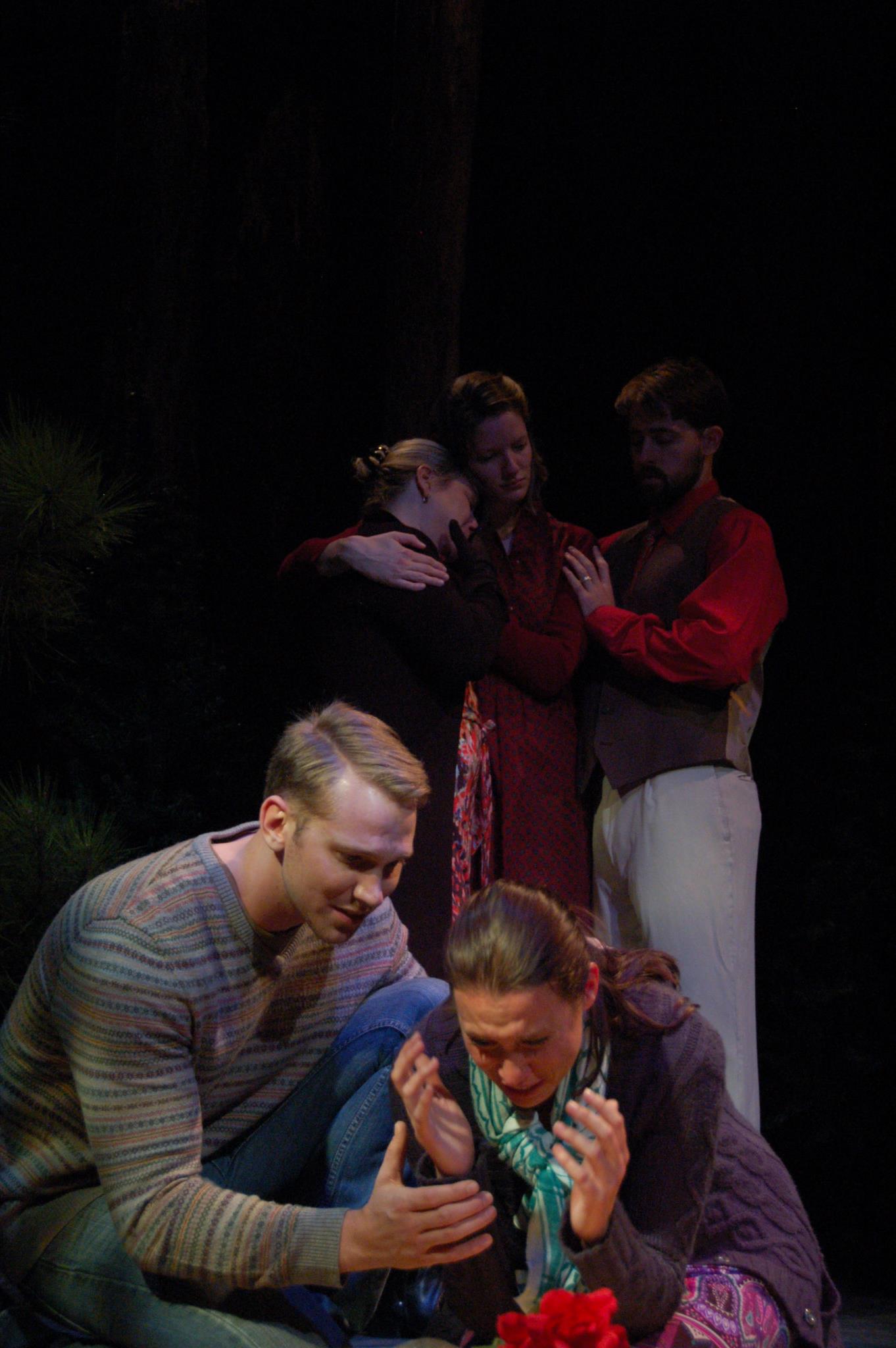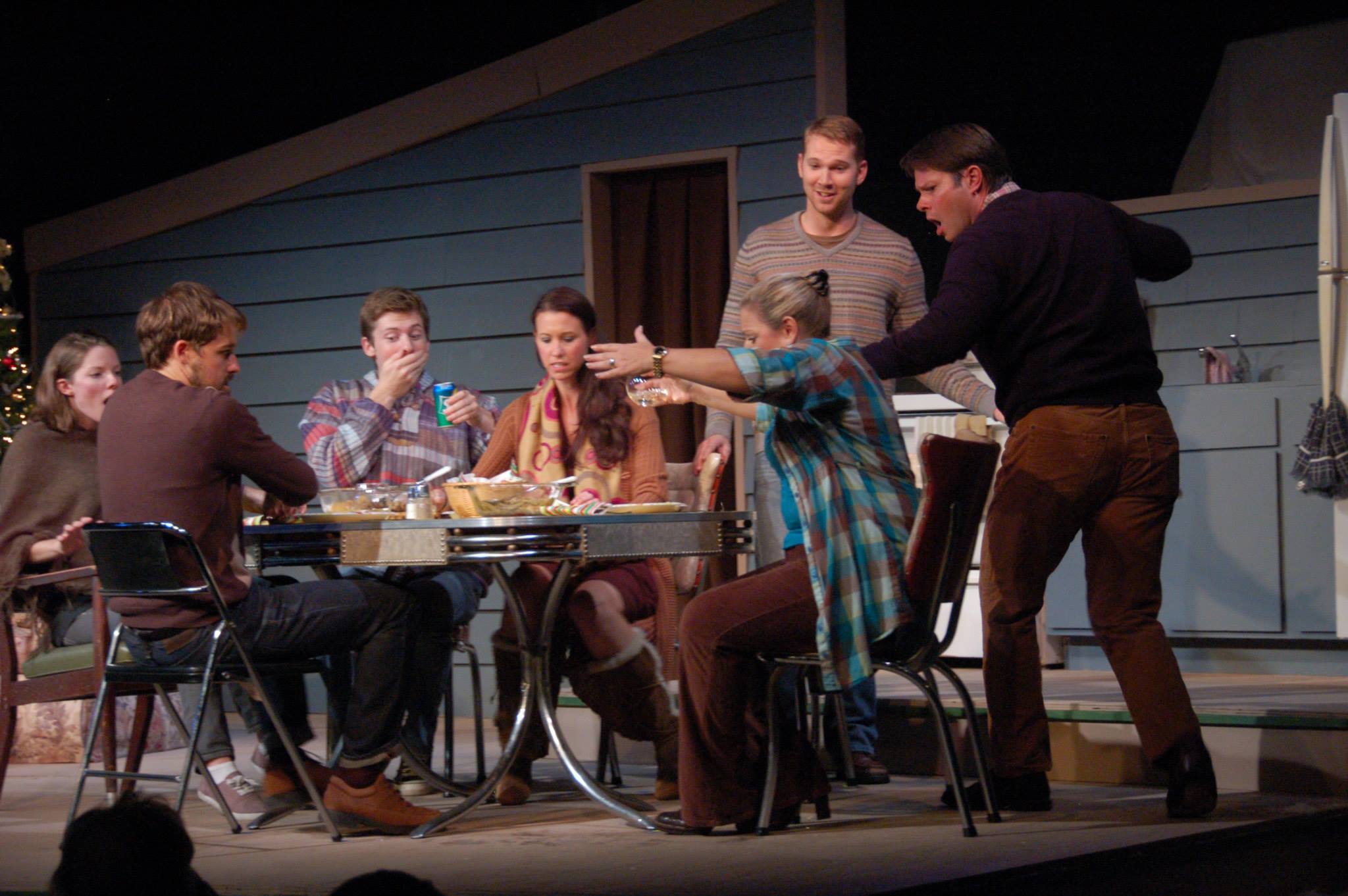 Pine, the winner of the Trustus Playwrights' Festival which runs through this coming Saturday, August 10th, has a double meaning in its title: the aroma of the trees that dominate stage right, and the prevailing cloud of mourning that has surrounded an upstate New York family since the death of middle son Colin five years previously. Never entirely a comedy nor a sentimental drama, this new play from Eugenie Carabatsos successfully explores the complex nuances of how ordinary people interact in situations we all face: loss of a loved one, inclusion of newcomers to the family, and changing dynamics when children become adults. The twist: Colin is still around. His spirit lingers in his family's home, and comments on all the action as it unfolds on stage.
Pine, the winner of the Trustus Playwrights' Festival which runs through this coming Saturday, August 10th, has a double meaning in its title: the aroma of the trees that dominate stage right, and the prevailing cloud of mourning that has surrounded an upstate New York family since the death of middle son Colin five years previously. Never entirely a comedy nor a sentimental drama, this new play from Eugenie Carabatsos successfully explores the complex nuances of how ordinary people interact in situations we all face: loss of a loved one, inclusion of newcomers to the family, and changing dynamics when children become adults. The twist: Colin is still around. His spirit lingers in his family's home, and comments on all the action as it unfolds on stage.
That twist is certainly nothing new, from literature (The Ghost and Mrs. Muir, Topper, Wilde's Canterville Ghost) to stage (I Hate Hamlet, Coward's Blithe Spirit) to film (the Patrick Swayze-Demi Moore movie Ghost, and big-screen versions of most of the preceding.) Following the conventions of the genre, it's therefore no plot spoiler to assume that one or more characters have unfinished business, but as in life, nothing is clearly spelled out. Are some characters still grieving, or did they never have a chance to? Is Colin trapped in limbo as a result, or is the unfinished business his?
Advance publicity and opening scenes where Colin speaks to the audience make it clear that Colin really is a ghost, i.e. this isn't Next to Normal, and he's not the product of anyone's delusion. As Colin, Hunter Bolton is up to the challenge of reacting to everyone's dialogue and movement without ever being acknowledged by the other characters. He's terribly under-used in the first act, simply because there's no one with whom to interact. Still, a number of audience members commented on how skillfully his body language and facial expressions convey his presence and feelings, even when he's a passive observer. The pace picks up significantly in the second act, when plot twists allow Colin to participate more, and the opening night audience gave the first scene of Act 2 a round of applause as a result. Bolton takes his time with every line, and is both sympathetic and believable as a decent, ordinary guy who has found no answer to his question: "If I'm gone, why am I still here?"
Indeed, all the characters are quite ordinary; one might almost say under-developed,except part of the point of the script is that this is a regular family, with no dysfunction beyond what would be expected. Becky Hunter as sharp-tongued mother Rita, Rachel Kuhnle as independent sister Julie, and Cory Alpert as troubled younger brother Teddy all look like they and Bolton could be related. Jennifer Moody Sanchez plays Rachel, Colin's fiancée (not his ex- fiancée, Colin is quick to assert, since they never broke up) who is still considered part of the family, but also is finally ready to move on with her life. Josiah Laubenstein as in-law Mike has some nice moments of comedy with Kuhnle; I enjoyed his portrayal of Edgar in USC's King Lear a few months back, but the manic tone that worked for Edgar's feigned madness is a little distracting here, and there's no line that couldn't benefit from being delivered an octave lower. He gets some of the show's biggest laughs, however, rejoicing when Rachel's new boyfriend supplants him as the barely-accepted outsider. In one of the show's many relatable and accessible themes, boyfriend Miles (Harrison Saunders) has to compete with the persisting presence of Colin, and how many of us have had to compete with the metaphoric ghost of a significant other's ex? Which is especially ironic, given that Bolton and Saunders fought for the hand of Juliet as Romeo and Paris in a memorable production in Finlay Park a few years ago.
I was prepared to say that Alpert's maturity makes him a little old for his role, but program notes reveal he is exactly the same age as his character, the teen who survived the car crash that killed Colin, and who states what I'm told is sadly all too common in such scenarios: "it should have been me." His scenes with Bolton are genuinely moving, as each wrestles their circumstances, the former pleading "I'd rather have this than nothing," while the latter despairs "I'd rather have nothing than this." Alpert and Bolton do nice work together as they reveal how family conflict can persist long after one of them is gone. Carabatsos excels in natural dialogue that captures the quirks of everyday life, as when wine is spilled on Rita's best pair of slacks, and she gripes that even a new pair won't be that same "best" pair. A culminating and cathartic scene allows each character to grieve in a different way, and to explain differing but understandable rationales.
Guest designer Chet Longley's set is more detailed than we have seen recently at Trustus, and includes a very believable patch of forest, and a simple recreation of the wooden-siding-covered exterior and interior of a home in the Catskills. I might have enjoyed a little more set decoration - mirrors or pictures on the wall, the occasional lamp or dresser - but as much space for movement needs to be opened up, in order for the cast to be able to move about freely with ever bumping into the invisible Colin. A nice touch is the way an upstairs bedroom is located directly above the kitchen, allowing Bolton to move easily from one to the other, perching on top of a refrigerator as a ghost might.
Director Dewey Scott-Wiley handles the challenges of blocking around an unseen and non-corporeal main character well, and takes full advantage of her cast's ability to wring emotion and meaning from pauses and silences as well as from lines. Her sound design might need a little tweaking, however, as audibility and clarity decreases the farther a character goes toward stage right. There is also a whooshing sound effect hat signifies Colin's presence that I never entirely "bought," although at the same time I can't think what, if anything, might work better.
Playwright Carabatsos graduated from college only three years ago, and is to be commended for her mastery of realistic dialogue and the ability to focus on and portray idiosyncratic character traits that we all possess. Her skill not only derives from what must surely have been an excellent education at Wesleyan University, but also, I suspect, from good genes: I discovered at opening night that her father, James Carabatsos, is the screenwriter of such films as Hamburger Hill, Sally Field's Heroes, and Clint Eastwood's Heartbreak Ridge. While completely unrelated to Pine, I must note that as recently as three weeks ago a group of baby boomers in a 5 Points bar paused while channel-surfing to chant "Swede, Swede, Swede!" along with Clint's platoon, that at least once a month for the last couple of decades I have quoted the "permission to speak freely?" line, and that also within this past month I quoted the immigrant soldier from Lost Battalion who proudly asserted that he was indeed an American: "I took the test!"
Pine is not the greatest play ever written, but it's certainly a good one. It could probably stand another re-write or two, to tighten up the story and perhaps drop about 30 minutes of chit-chat. The characters too could be more fully developed - we could see Teddy as more fragile, more lost, and more at risk, and Rita could be meaner and feistier, a la Shirley MacLaine in Terms of Endearment (and everything she's done since.) Pine's tone is very much like that film, or the play and film Steel Magnolias, both full of memorable laugh lines but ultimately dealing with death. It would be very easy to say the ending is all too predictable, but in the last half hour, I found myself desperately wanting just that ending and no other. Which makes me think that the characters became people that I cared about. A friend and colleague noted that he felt his emotions were a little manipulated, and I can certainly see that. My reaction, however, is excitement and joy that such a young writer has mastered the skill of manipulating emotions! Either way, I don't think there was a dry eye in the sold-out opening night house by the show's end, and I rarely cry at live theatre.
Pine may not go on to win any Tony Awards - although it would be extremely cool if it did - but could certainly make for a decent Hallmark Hall of Fame movie. What's much more important is this chance to nurture and encourage the growth of a new, talented author, and I wouldn't be surprised at all if one day Pine is seen as a promising early work from an acclaimed playwright. But make those reservations now - there are only three more chances to be part of theatre history, with shows this coming Thursday, Friday, and Saturday nights at 8 PM. Contact the Trustus box office at (803) 254-9732 or visit www.trustus.org for more information.
~ August Krickel




